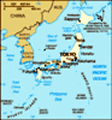Advertisement
Published: March 18th 2008
March is beginning of spring and breathes new life into the world. It also marks the end of the school year in Japan, and people celebrate the new phases of life awaiting them. While the ume (plum) trees open their buds, upper classmen prepare for entrance exams and graduation, while younger students are rewarded their new leadership roles.
It was very exciting to be a part of a Japanese public school this year. It allowed me to learn more about the culture than I could have imagined, and put me in position to befriend people I wouldn't otherwise have access to. The past two weeks have involved a lot of goodbyes, as the seniors graduate and I prepare to transfer schools next month. By next week, I will be living in Yonago, 80km east of my current humble town.
Last week was graduation, and my last days at one of the junior highs. The day before graduation, no classes were scheduled so that we could ready the school. We spent the morning in the gym, watching the students practice filing in and singing the school song. It is far more formal than graduations I remember. In Japan, it’s a happy, but
very solumn affair. All the teachers conduct themselves in a serious manner, and wear their most formal black attire.
After the students finished rehearsal, I was told I was to give a farewell speech to the school. When my speech was over, the students surprised me with a bouquet of flowers and words of gratitude. Sometimes at the school, I had felt like an outsider, watching everyone work as though observing a fish tank. Sometimes, I would feel helpless, or useless. But this act of appreciation toward me put my heart at peace.
After lunch, we cleaned and decorated the school for the big day. The children worked diligently sweeping out shoe lockers and hanging colorful paper chains across the entranceway. I worked outside gardening with the younger students, whom spent most of the time spraying each other with the hose and taking turns riding in the wheelbarrow. I rode home happy and exhausted through freshly turned rice paddies.
The next day, I came to school in my black attire, and watched the teachers bustle about, preparing tea for the guests and affixing flowers to their lapels. Many of the teachers had gone to the beauty salon at six that
morning to be put into kimono. After one more morning rehearsal, parents began filing into the gym, most of which were the mothers. Since graduation ceremonies in Japan occur during the weekdays, fathers whom have important jobs can’t attend. Yesterday, one of our own teachers commented to me that his son was having his graduation ceremony at that very minute. What a shame that an event that is obviously so important to the Japanese cant be attended by some parents. Again, it is the tradition of duty over love, I suppose. Next, several town elders entered, and each one’s arrival had to be recognized with a bow. I felt like my spine was a mattress spring, but little did I anticipate just how much bowing was yet to come that day.
At last we were called to attention, and the students paraded in whilst the band played, each class lead by their homeroom teacher, decked out in kimono for the affair. The students don’t graduate in cap and gown, but wear their uniforms, with a colorful ribbon pinned to their chest. After we sang the school song, the principal did role call and gave a speech. Diplomas were handed out
next, at the start of the ceremony, and speeches by the town elders followed. Next the lower classes each gave a speech of gratitude to their upperclassmen. The girl who had given me the bouquet the previous day approached the stage. She began to give a speech on behalf of her graduating class. First, she spoke to the students, expressing the good times and togetherness they shared. Next, she turned to the teachers and expressed gratitude. And finally, she addressed the parents there that day, and it was at this point all of the students and parents began crying. Although I didn’t understand all that was said, witnessing the emotion in the room almost brought me to tears as well.
All the students then turned to face the parents and sang to them. Those 15year-olds whom graduated that day has more sense of self-responsibility than any that I have seen. These speeches were written by the students themselves, and they spoke through a mature heart.
More emotional goodbyes followed that day, as the graduates made their last stroll through the halls, now lined with lower classmen, holding out flowers, notes, and pictures for their favorite upper classmen. It was a
display of smiles, tears, and hugs. I had my share of goodbyes to the students, signing yearbooks, posing for photos, and receiving notes and paper cranes from my more adoring students.
Afterwards, in the teachers room, we were served sakura (cherry blossom) tea, which is traditionally enjoyed on special occasions. Last years dried blossoms are placed in a bowl of hot water and float to the top like a delicate sea creature. It is beautiful to look upon, with a delicate scent, but it tastes like salt water. Even the Japanese admit that the taste is disgusting, but they tell me it is served because it makes them happy, it reminds them of the new life that spring brings.
This was my last day at that school, and so I attended my last kendo class with the students I've grown closest to over these months. As a goodbye present, I made them all friendship bracelets, which they were more excited about than I thought they would be. The girls made me cookies and cards, and the boys took turns signing my kendo head wrap as a memento. I think out of everything in Shimane, I will miss our kendo class
the most.
March is also the month of another school tradition. Every March, Japanese teachers face review by the education board, and I got to go along for the ride. The purpose of these observation classes are to make sure standards of education are being met. But the teachers are given advanced warning about the visit, and so these observed classes turn into an
English lesson extravaganza of props, signs, videos, and powerpoint presentations! The teachers spend all week preparing for the event, using other classes as test subjects for the lesson to be presented, and then holding rehearsal the day before. As the ALT, I was involved in one of these at each school this month. Although I would be there 'team teaching' the class with them, I knew it was the Japanese teachers who were in the hot seat, so I tried my best to go along with their scheme and just followed orders. Half a dozen educators showed up to observe the lesson, standing in the back of the room and taking notes. It went well, but even the kids seemed so overwhelmed by the super-spectacular lesson, that it was hard for them to take in what
they were really being taught.
After the class, we met in the principal’s office for a feedback meeting. It was my first time attending a Japanese meeting and I found it very interesting to be present. Firstly, when we came into the meeting room, the younger teachers were setting each place with hot
ocha and delicately wrapped pastries. The education officials then entered, and we stood to bow. As we sat down to the meeting, I noticed no one was touching the refreshments layed out before us, so I refrained, staring longingly at my steamy mug. Rank mandated the meeting, and so the minister of education spoke first, then the principal, and then the senior English teachers were allowed to voice their opinion. The younger teachers and myself were not asked to speak during the meeting. What I found interesting, sitting there listening, was the lack of assertiveness in the statements of even the head officials. Every sentence was finished with the words,
omoimasu, which means "I think...". Opinions were not concrete, rather suggestions for agreement. This kind of behavior would be taken as weak leadership in the west, but here it is the way you grease the wheel. As
the meeting commenced, at last some teachers took a sip of their now cold tea, but pastries were carefully hidden away in bags to be eaten later without perceived embarrassment.
I've realised a few things this month. That its easy to be a lousy teacher, but its hard to be a good one. Not just in Japan, but for teachers everywhere. I wonder if I'm too selfish of a person to have the commitment it takes to dedicate your life to raising someone else’s children.
I've also realised that you can make a difference to someone, even if you don't speak their language. Especially nowadays, when there are so many crap tourists who travel abroad and get drunk, act stupid, and generally exploit the very culture they are guests of. It is vital to show these natives that your kind can be a decent human being, too.
And so, I now look toward the new life that I will soon begin in Yonago, equipt with the language and knowledge I need to explore the further depths of my fishtank existance....
*to view a more complete collection of photos,
click
HERE
Advertisement
Tot: 0.159s; Tpl: 0.02s; cc: 11; qc: 30; dbt: 0.0994s; 1; m:domysql w:travelblog (10.17.0.13); sld: 1;
; mem: 1.1mb









